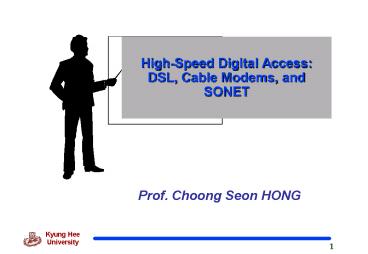Prof. Choong Seon HONG - PowerPoint PPT Presentation
Title: Prof. Choong Seon HONG
1
High-Speed Digital Access DSL, Cable Modems,
and SONET
- Prof. Choong Seon HONG
2
9.1 Digital Subscriber Line (DSL)
- uses a newer technology that used the existing
telecommunications networks such as the local
loop telephone line. - is an asymmetric communication technology
designed for residential users it is not
suitable for business. - xDSL where x can be replaced by A, V, H, or S
- The existing local loops can handle bandwidths
up to 1.1 MHz - by removing the filter at the end of line of
telephone company - but, limitation because of distance between the
residence and the switching office, size of cable - ADSL is an adaptive technology. The system uses a
date rate based on the condition of the local
loop line
3
DSL
- DMT
- Modulation technique that has become standard
for ADSL is called the discrete multitone
technique (DMT) which combines QAM and FDM.
4
DSL
- voice channel 0 is reserved for voice
- Idle channel 1 to 5 are not used gap between
voice and data communicaiton - Upstream data and control channels 6 to 30
(25channels) one channel for control - Downstream data and control channels 31 to
255(225 channels) 13.4 Mbps one channel for
control
5
DSL
- Actual Bit Rate
- Upstream 64 Kbps to 1 Mbps
- Downstream 500 Kbps to 8 Mbps
- Because of the high signal/noise ratio
6
DSL
- Customer site ADSL modem
7
DSL
- Telephone Company Site DSLAM
8
DSL
- Other DSL Technologies
- SDSL Symmetric Digital Subscriber Line
- HDSL High-bit-rate digital subscriber line
- an alternative to the T-line (1.544 Mbps)
- using 2B1Q encoding
- up to 3.6 Km
- using 2 twisted-pair wires for full-duplex
transmission - VDSL Very-high-rate digital subscriber
- using coaxial cable, fiber-optic, or twisted
pair cable for short distances (300 to 1800 m) - using DMT with a bit rate of 50 to 55 Mbps
downstream and 1.5 to 2.5 Mbps upstream
9
9.2 Cable Modem
- Traditional cable Networks
- community antenna TV (CATV)
- Communication in the traditional cable TV network
is unidirectional.
10
Cable Modem
- HFC Network
- RCH Regional cable head serving 400,000
subscribers - Distribution hub serving 40,000 subscribers
- Coaxial cable serving 1,000 subscribers
- Communication in HFC cable TV network can be
bidireactional.
11
Cable Modem
- Bandwidth
- video band
- 54 to 550 MHz
- TV channels 6 Mhz x 80 channels
- Data downstream band dividing into 6Mhz
channels
12
Cable Modem
- Modulation
- Downstream data are modulated using 64-QAM
- Data rate
- 6 bits for each baud in 64-QAM (1bit control
bit) - Theoretically, 5bits/Hz x 6 Mhz 30 Mbps
- Upstream data band
- Modulation
- upstream data band uses lower frequencies that
are more susceptible to noise and interference - for this reason, using QPSK instead of QAM
- Data rate 2 bits/hz x 6 Mhz 12 Mbps
13
Cable Modem
- CM is installed inside the distribution hub by
the cable company.
14
Cable Mode
- Cable modem transmission system(CMTS)
15
9.3 SONET
- Synchronous Optical Network ANSI standard
- Synchronous Digital Hierarchy SDH
- SONET is a synchronous TDM system controlled by
a master clock
16
SONET
- SONET Frame
SPE synchronous payload envelope
17
SONET
- SONET rates
STS OC Rate (Mbps) SPE (Mbps) User (Mbps)
STS-1 OC-1 51.84 50.12 49.536
STS-3 OC-3 155.52 150.336 148.608
STS-9 OC-9 466.56 451.008 445.824
STS-12 OC-12 622.08 601.344 594.432
STS-18 OC-18 933.12 902.016 891.648
STS-24 OC-24 1244.16 1202.688 1188.864
STS-36 OC-36 1866.23 1804.032 1783.296
STS-48 OC-48 2488.32 2405.376 2377.728
STS-192 OC-192 9953.28 9621.604 9510.912
18
SONET
- Date Rates
19
SONET
- STS Multiplexing































